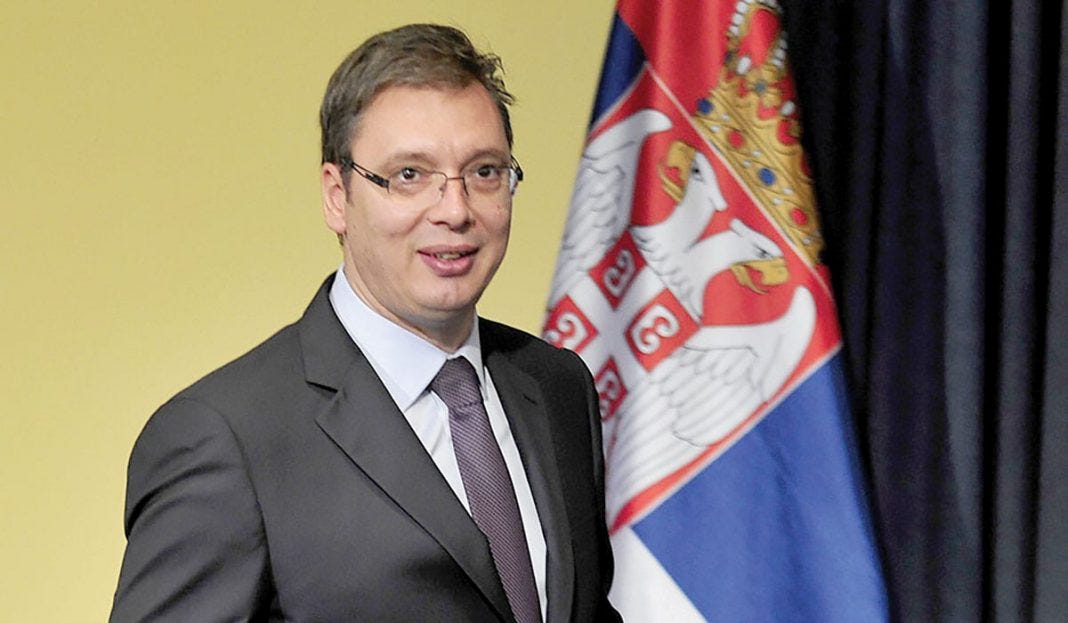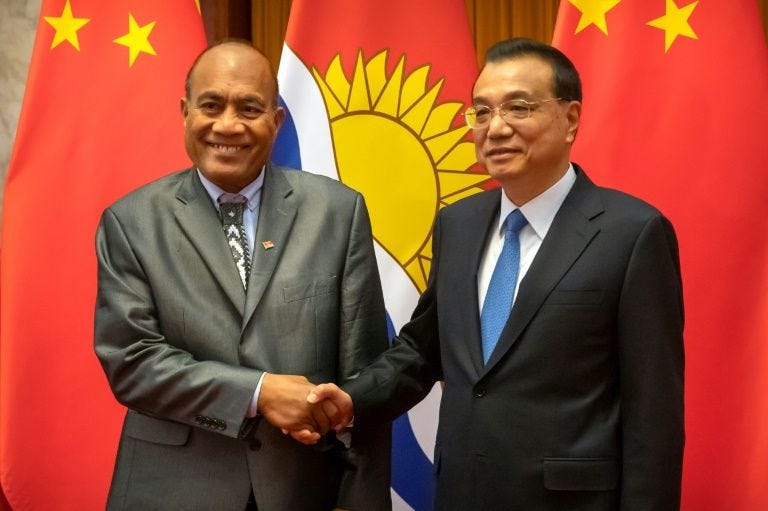Hello! Welcome to another election special of Inside The Newsroom, as we continue our journey rounding up every major election around the world. Today we dig into what went down in Serbia, where President Aleksandar Vucic’s incumbent Serbian Progressive Party (not progressive) increased their power and are expected to take a supermajority into their next term. In Kiribati, re-elected President Taneti Maamau, who recently ditched official ties with Taiwan for China, could play a major role in the national security of the U.S. And results are still being counted in Malawi, with reports claiming it’s too close to call. Let’s get straight to it! Enjoy 🤓
How you like me now?
Hello. Each newsletter takes a real long time to put together. It’s totally worth it, but if you could click the heart at the top of the page, I’ll receive additional dopamine that’ll carry me through the day. Please and thank you. 🙏
Job Corner
Deadlines coming up in the next few days include for the Knight Science Journalism fellowships, Politico and the BBC. Check out almost 400 active journalism jobs, internships and freelance contracts. Please spread the word. 🤜🤛
Serbia Goes to the Polls 🇷🇸
Serbia went to the polls on Sunday as the incumbent Serbian Progressive Party (don’t let the name fool you) strengthened their power in the National Assembly, giving them more than 60 percent of the seats, according to projected results by Ipsos and CeSID. The election was mired in controversy (what’s new?) as the vote was boycotted by most opposition parties to protest President Aleksandar Vucic’s authoritarian policies, that have led to the country falling to ‘Partly Free’ status, according to Freedom House. The “progressives” are on track to secure a supermajority, which will allow them to change the country’s constitution without the approval of any opposition. Amid the pandemic and boycott, turnout reportedly fell to 48 percent from 57 percent in 2016.
Aleksandar Vucic 👇 | Credit: CorD Magazine

A Return to the Past?
What happens next will have major influence on the relationships between countries in Southern Europe, which already has a bloody and forgettable past. Are you ready for a swift history lesson? Here goes… The nation of Serbia as we know it was formed just 14 years ago, but let’s go all the way back to 1918, when Serbia, Croatia and Slovenia formed one kingdom after World War One, and then renamed itself Yugoslavia in 1929. In the immediate aftermath of World War Two, Macedonia, Bosnia and Montenegro joined the newly named Socialist Federal Republic of Yugoslavia. Then in 1989, politician Slobodan Milosevic became president of Serbia, who was seen as a symbol of Serbian nationalism. Two years later and Slovenia, Macedonia, Croatia and Bosnia all broke away from Yugoslavia, which left Montenegro and Serbia to form a new Federal Republic of Yugoslavia in 1992. Which is also the year the Bosnian War started between Bosnia and Herzegovina, and Croatia and Serbia, which saw almost 100,000 people killed including 65,000 Bosnian Muslims. Let’s take a breath.

Okay we’re back. Milosovic was then elected president of Yugoslavia in 1997, and was immediately met with rebellion from the Kosovo Liberation Army, and only withdrew his troops because of Nato air strikes. Mass protests against Milosevic brought in the new millennium and caused Milosevic to quit, who was then extradited to the Hague for war crimes, but was found dead in a UN war crimes tribunal's detention centre, and thus was never found guilty. With Milosevic out of the picture, the Yugoslavian parliament consigned the country to history, forming the Union of Serbia and Montenegro (remember them?). But that didn’t last long and Montenegro seceded from Serbia in 2006 in a referendum that passed by 55.5 percent, just half a percent above the threshold to pass. Then in 2008, Kosovo declared independence from Serbia, but Serbia maintains that declaration illegal to this day. Which pretty much brings us to 2020… I’m tired. Let’s move onto Kiribati…
2020 Elections So Far
May: Burundi 🇧🇮 and Suriname 🇸🇷
April: South Korea 🇰🇷
March: Israel, Slovakia + Tajikistan 🇮🇱🇸🇰🇹🇯
February: Cameroon, Ireland + Azerbaijan 🇨🇲🇮🇪🇦🇿 + Iran + Togo 🇮🇷🇹🇬
Kiribati Results 🇰🇮
The second election of the week took place on the tiny Pacific island of Kiribati, home to a little more than 115,000 people. We don’t usually cover such small elections, but Kiribati stands out in two main ways. The first of those is that the re-election of President Taneti Maamau on Monday is a potentially huge victory for China. In September last year, Maamau switched allegiances and officially recognized China as a nation and cut official ties with Taiwan. Those who followed Taiwan’s election in January will know that President Tsai Ing-Wen’s re-election will mean more freedom and democracy on the island, and less cooperation with China. Now China has a strategic ally just 1,800 miles from Hawaii. And according to Foreign Policy, the prospect of China gaining a foothold on Kiribati’s Christmas Island is a concern for the U.S. military.
President Taneti Maamau (left) 👇 | Credit: AFP

The second reason why Kiribati is significant is the fact that it might become extinct by the turn of the next century. According to the IPCC’s landmark climate change report from 2018 that said we have 12 years to avoid irreversible damage from the effects man-made climate change, islands such as Kiribati could be swallowed by rising sea levels. With its population of just 115,000 people, Kiribati’s individual impact on the eventual outcome of the climate emergency will be minimal, but establishing ties with China, the world’s largest polluter, will do no favours to the fight against the survival of our planet.
Malawi Is… Still Counting 🇲🇼
Come on Malawi! Why can’t you be like Serbia and Kiribati? Not in the sense of their bloodied history or allegiance with China, but having your votes counted within 24 hours! Didn’t you know speed trumps accuracy? Seeing as Malawi is taking its time to report accurate results, let’s dig into the background of their election…
Tuesday’s presidential vote was a rerun after the May 2019 vote was ruled illegitimate by the country’s Supreme Court because of rigged results, including correction fluid found on results sheets. The two horse race is being fought between incumbent President Peter Mutharika and opposition leader Lazarus Chakwera. Mutharika has served as president since 2014, and is the brother of former President Bingu Wa Mutharika, who died in 2012 from a heart attack. Since then, Peter was charged with treason for attempting to cover up his brother’s death to prevent then vice-president Joyce Banda from taking over as leader. Meanwhile, Malawi has one of the world’s highest rates of HIV-Aids and is home to more than one million children who have been orphaned because of the disease. Hopefully we’ll have full results in next week’s newsletter.
Peter Mutharika 👇 | Credit: Al Jazeera




